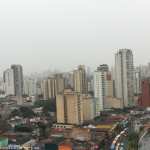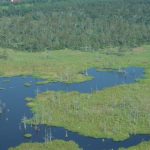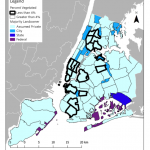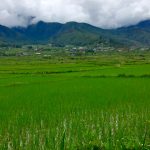
Although the Atlantic Forest covers 463,000 square miles of Brazil’s eastern coast and supports around 60 percent of the country’s threatened animal species, it is not as celebrated as the Amazon Rainforest. Like the Amazon, it is one of the most biologically diverse and productive ecosystems in the world.

The best maps tell stories. They take us on journeys in places both familiar and strange, revealing information that might not have been evident before. They also tell these stories remarkably quickly, allowing us to gain a better understanding of situations or make decisions in short periods of time

Growing up, I never knew what mangroves were. In fact, whenever someone mentioned them, I thought they were talking about mangos. But of course they’re not tropical fruit. They’re coastal plants that live in the transition zone between the ocean and land and offer a wealth of services for both people and the environment. They are crucial in the fight against climate change.

From Hurricane Sandy to flooding in Miami, climate change already poses existential threats to our homes. It fuels the spread of mosquito-borne diseases and exacerbates violent conflicts, threatening our health and our lives. Climate change is a danger as personal as it is global, and it has hurt so many of us. I came to Climate and Society because by friends are beginning to lose hope, and I needed to find a way to keep that hope alive.

Energy has always been a hot topic and with good reason. Historically, access and production of energy has been vital for economic development. But with the increasing threat of climate change, our relationship with energy has been changing. It is important that we focus on our relationship with energy and the symbolic value we have placed on certain types of energy in order to move forward.

Krista Jankowski faced a choice. Discover the wonders of deep history or help preserve and heal the planet for this and future generations. She chose the latter, forsaking dinosaurs to join the C+S program. Since then, she’s gone on to pursue a PhD focusing on sea level rise in Louisiana. Her work has the power… read more

The effects of anthropogenic climate change – specifically sea-level rise due to ice melt and thermal expansion – are likely to threaten already vulnerable coastal wetlands in Louisiana according to a new study published in Nature Communications on Tuesday. The study was conducted by Climate and Society 2010 alum Krista L. Jankowski and colleagues at… read more

These areas can be publicly or privately owned, which often affects public accessibility. The Nature Conservancy’s New York City Program is working on putting together a cohesive data set of open space and land ownership in the city in order to assess which entities the Conservancy must work with to promote increased public access to open space.

This summer, I have been working at the Center for Climate Systems Research (CCSR) on the Adaptation for Development and Conservation (ADVANCE) Partnership—a joint program of CCSR at Columbia University and the World Wildlife Fund (WWF). The ADVANCE approach is a method of co-generating climate change information through working with stakeholders and decision-makers from a wide range of backgrounds.

Climate change is real and so are its impacts. That’s why 195 nations from around the world came together last December to sign the Paris Agreement. This marks the first global agreement aimed at keeping the global average temperature increase below 2°C.













